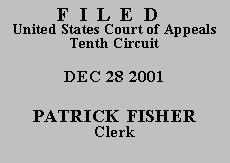

|
TOM DUGGER, |
|
Before HENRY, BRISCOE, and MURPHY, Circuit Judges.
Tom Dugger, proceeding pro se, is before this court seeking a certificate of appealability ("COA") which he must obtain before he can appeal the district court's denial of his habeas corpus petition.(1) See 28 U.S.C. § 2253(c)(1)(A). Dugger was convicted of second degree murder in Oklahoma state court and was sentenced to life imprisonment. On August 23, 2000, Dugger filed the instant habeas corpus petition wherein he asserted that Okla. Stat. tit. 57, § 332.7, a statute enacted after he was sentenced, requires the state of Oklahoma to recalculate his sentence under the applicable matrix of the Oklahoma Truth in Sentencing Act.
The district court assigned Dugger's petition to a United States magistrate judge pursuant to 28 U.S.C. § 636(b)(1)(B). The magistrate judge recommended that the petition be dismissed. After reviewing Dugger's objections, the district court adopted the magistrate judge's Report and Recommendation, and denied Dugger's petition.
Dugger claims that Okla. Stat. tit. 57, § 332.7(F) creates a constitutionally protected liberty interest in the recalculation of his sentence. That statute provides,
The Department of Corrections and the Pardon and Parole Board shall promulgate rules for the implementation of subsections A, B and C of this section. The rules shall include, but not be limited to, procedures for reconsideration of persons denied parole under this section and procedure for determining what sentence a person eligible for parole consideration pursuant to subsection A of this section would have received under the applicable matrix.
Subsection A of § 332.7 contains provisions used to determine the parole-consideration date for prisoners whose crimes were committed prior to July 1, 1998. See Okla. Stat. tit. 57, § 332.7(A). The magistrate judge considered Dugger's argument and concluded that "[t]here is simply no reasonable interpretation of subsection (F) that would require 'modification' or 'recalculation' of any inmate's sentence." We too have read § 332.7(F) and conclude that the magistrate's interpretation is irrefutable. While § 332.7(F) contemplates that an inmate's sentence may be recalculated by using the applicable matrix of the Oklahoma Truth in Sentencing Act, it is clear that the sole purpose of any recalculation is to determine the date upon which the inmate becomes eligible for consideration for parole. Contrary to Dugger's assertions, our reading of the statute does not render it unconstitutionally vague.
We fully agree with the district court that § 332.7(F) does not create any liberty interest protected by the Due Process Clause. Consequently, Dugger's habeas petition fails to assert the denial of a federal constitutional right. See 28 U.S.C. § 2241(c)(3) (providing that "[t]he writ of habeas corpus shall not extend to a prisoner unless . . . [h]e is in custody in violation of the Constitution or laws or treaties of the United States"); id. § 2254(a) (same). Dugger has not made a substantial showing of the denial of a constitutional right and, therefore, he is not entitled to a COA. See 28 U.S.C. § 2253(c)(2). We deny Dugger's application for a COA for substantially those reasons set out in the magistrate judge's Report and Recommendation dated March 19, 2001 the district court's order dated May 16, 2001 and dismiss his appeal
ENTERED FOR THE COURT
Michael R. Murphy
Circuit Judge
*. This order and judgment is not binding precedent, except under the doctrines of law of the case, res judicata and collateral estoppel. The court generally disfavors the citation of orders and judgments; nevertheless, an order and judgment may be cited under the terms and conditions of 10th Cir. R. 36.3.
1.Dugger filed his habeas petition pursuant to 28 U.S.C. § 2254. The district court construed the petition as arising under 28 U.S.C. § 2241. For purposes of this appeal, it is irrelevant whether Dugger's petition is properly construed as arising under § 2241 or § 2254 because he must obtain a COA in either case. See Montez v. McKinna, 208 F.3d 862, 867 (10th Cir. 2000) ("[C]onsistent with the plain language of [28 U.S.C.] § 2253(c)(1)(A), this court holds that a state prisoner must obtain a COA to appeal the denial of a habeas petition, whether such petition was filed pursuant to § 2254 or § 2241 . . . .").